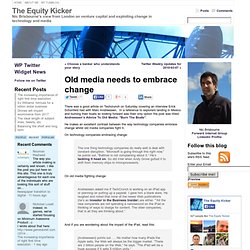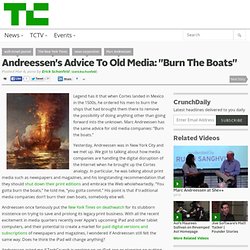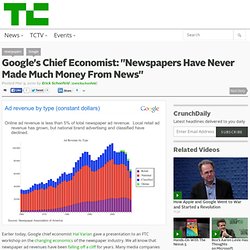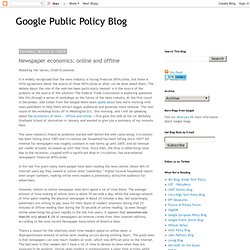

iPad Owners Are Spending $70,000 Per Day In Newsstand [Report. Apple’s Newsstand is only about 6 months old, but it’s already raking in a decent amount of cash for media publishers.

According to a new report, iPad owners are spending $70,000 per day for content in the iOS 5 Newsstand. Consumers are buying subcription-based content from publications like The New York Times, The New Yorker, and The Daily. Unsurprisingly, the majority of revenue is coming from in-app purchases. According to Distimo, news apps account for 7% of the top 200 grossing apps for the iPad. While the revenue is nice for publishers, $70,000 per day isn’t exactly saving the publishing industry. Related. Old media needs to embrace change. There was a good article on Techcrunch on Saturday covering an interview Erick Schonfeld had with Marc Andreessen.

In a reference to explorers landing in Mexico and burning their boats so looking forward was their only option the post was titled: Andreessen’s Advice To Old Media: “Burn The Boats”. He makes an excellent contrast between the way technology companies embrace change whilst old media companies fight it. On technology companies embracing change: The one thing technology companies do really well is deal with constant disruption. “Microsoft is going through this right now,” he points out, “Ballmer is not complaining about it.” On old media fighting change: Andreessen asked me if TechCrunch is working on an iPad app or planning on putting up a paywall. Andreessen’s Advice To Old Media: “Burn The Boats” Legend has it that when Cortes landed in Mexico in the 1500s, he ordered his men to burn the ships that had brought them there to remove the possibility of doing anything other than going forward into the unknown.

Marc Andreessen has the same advice for old media companies: “Burn the boats.” Yesterday, Andreessen was in New York City and we met up. We got to talking about how media companies are handling the digital disruption of the Internet when he brought up the Cortes analogy. In particular, he was talking about print media such as newspapers and magazines, and his longstanding recommendation that they should shut down their print editions and embrace the Web wholeheartedly. “You gotta burn the boats,” he told me, “you gotta commit.” Andreessen once famously put the New York Times on deathwatch for its stubborn insistence on trying to save and prolong its legacy print business.
Andreessen asked me if TechCrunch is working on an iPad app or planning on putting up a paywall. Google’s Chief Economist: “Newspapers Have Never Made Much Money. Earlier today, Google chief economist Hal Varian gave a presentation to an FTC workshop on the changing economics of the newspaper industry.

We all know that newspaper ad revenues have been falling off a cliff for years. Many media companies blame Google and are trying to put the genie back in the bottle with partial metered models for online news. Google is understandably on the defensive, trotting out Varian to paint an unemotional picture with as much data as he can muster. Newspaper economics: online and offline. Posted by Hal Varian, Chief Economist It is widely recognized that the news industry is facing financial difficulties, but there is little agreement about the source of those difficulties or what can be done about them.

The debate about the role of the web has been particularly heated: is it the source of the problem or the source of the solution? The Federal Trade Commission is exploring questions like this through a series of workshops on the future of the news industry. At the first round in December, Josh Cohen from the Google News team spoke about how we're working with news publishers to help them attract bigger audiences and generate more revenue. The next round of the workshop kicks off in Washington D.C. this morning, and I will be speaking about the economics of news -- offline and online.
The news industry's financial problems started well before the web came along. However, visitors to online newspaper sites don't spend a lot of time there. What about search engines? Hal Varian Is Right: Newspapers Need to Engage – GigaOM. As part of the Federal Trade Commission’s ongoing hearings into the future of journalism, Google’s chief economist, Hal Varian, gave a presentation on newspapers and their financial problems that is well worth taking some time to read (or view).

The slide deck is embedded below, and Martin Langeveld has a great overview at the Nieman Journalism Lab that also includes a transcript of Varian’s presentation. The Google economist (who also wrote a blog post) does a pretty thorough job of explaining the untenable position that newspapers currently find themselves in, and how it isn’t the Internet’s fault (in other words, it isn’t Google’s fault). Traditionally, the ad revenue from these special sections has been used to cross-subsidize the core news production. Nowadays internet users go directly to websites like Edmunds, Orbitz, Epicurious, and Amazon to look for products and services in specialized areas. 030910 Hal Varian FTC Preso. News Panel: The Only Thing That Can Stop The iPad Is Apple.